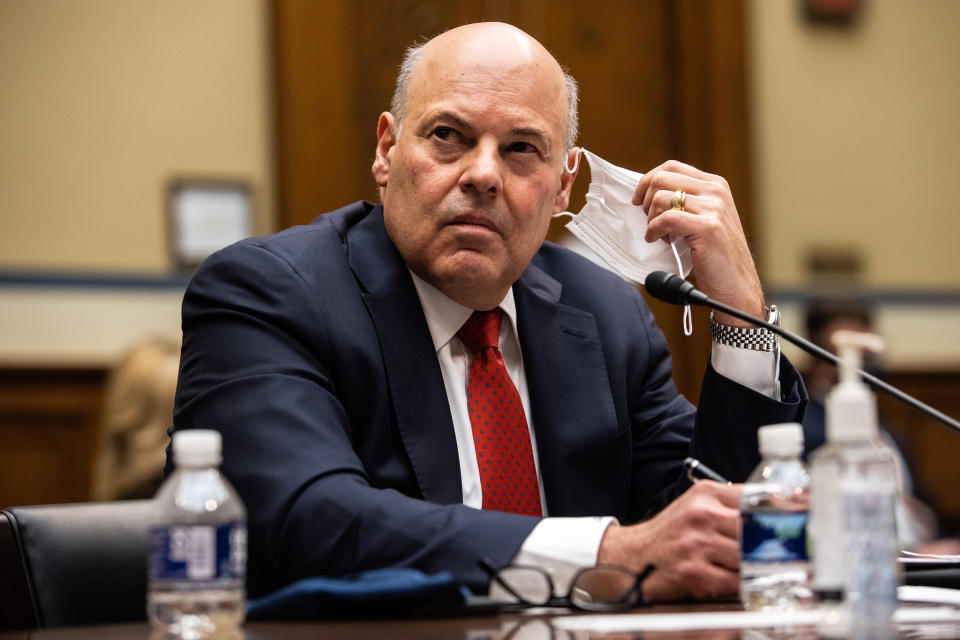U.S. Postal Service to consolidate 18 facilities, leading to concerns over mail delays
The U.S. Postal Service announced plans this week to consolidate 18 of the country's major mail sorting facilities in coming months. Officials of the postal workers union say the move could redirect mail in some regions by nearly 100 miles and further delay delivery.
Advocates of rural communities also expressed concern that plant consolidation plans could create problems for farmers who rely on livestock deliveries.
The 18 mail processing centers that are being consolidated are located throughout the country, including plants in Erie, Pennsylvania; Wausau, Wisconsin; Huntsville, Alabama; Gainesville, Florida; Newburgh, New York; Paducah, Kentucky; and Seattle, according to the American Postal Workers Union, or APWU. The APWU said mail previously directed to those plants will be redirected to other facilities.
In a statement to NBC News, the USPS said it is "looking to repurpose" the centers being consolidated.
Kim Frum, a spokesperson for the Postal Service, said in a statement that the restructuring has been talked about since 2015 and that it is part of a larger plan to boost efficiency. Frum said that the consolidations will be completed by November and that they "will lead to more efficient and reliable performance in our plants."
But veteran postal workers said the consolidations mean mail in some regions will be rerouted to facilities that could take additional hours to reach by truck.
"These consolidations are going to lead to further mail delays," said Lori Cash, a 23-year veteran of the Postal Service, who is president of the APWU's Western New York Area Local. "This consolidation plan is going to create hardships, especially for our smaller rural communities. They are always the ones that get hit. Some of these consolidations are going to mean rerouting mail to distances up to two hours away, and you're looking at an additional one-day, two-day, three-day service change in our delivery."
Cash noted that, according to the plans, New York's Mid-Hudson postal sorting facility in Newburgh will be consolidated with the Albany postal sorting facility 90 minutes away. That means, Cash said, that letters previously processed in Newburgh might now be on trucks for an additional 90 minutes to get to their new sorting destination in Albany, which could delay delivery.
The consolidation of two plants in Wisconsin could result in similar delays, critics said. According to the APWU, the mail processing plant in Wausau will be consolidated with the facility in Green Bay, nearly 100 miles away. That is a two-hour drive by truck.
Mark Dimondstein, president of the APWU, said he worries that the consolidation plans will further strain the mail delivery system in multiple regions.
"Previous plant closures and consolidations were a complete failure that only cut service, slowed down mail and disrupted workers' lives," Dimondstein said in a statement. "The past year has shown that the public relies on postal workers and they deserve the prompt reliable and efficient service promised them under the law. Additional plant consolidations will only hurt postal workers and customers alike. Postal management should instead focus on restoring the quality service that the people deserve."
Matt Hildreth, executive director of RuralOrganizing.org, a rural advocacy group based in Columbus, Ohio, said: "Rural communities live and die depending on connectivity. Rural communities need to be able to depend upon post offices for timely deliveries, not more delays."
Farmers in particular cannot afford the kinds of significant mail delays they experienced over the summer, when Postmaster General Louis DeJoy's implementation of new policies delayed delivery of livestock, Hildreth said. In some instances, delays resulted in the deaths of baby chicks and other animals that were shipped through the mail. FedEx and UPS do not deliver livestock.

He said he was concerned that the consolidations could result in a return to last year's problems. "Nothing that I've read from [the Postal Service] statement looks good at this point," Hildreth said. "It seems like there's a deliberate attempt to break the post office so that private industry can complain about the post office being broken."
The Postal Service said in a statement that consolidating the postal sorting facilities is not expected to delay Express or Priority mail and that it will not result in layoffs. The statement said the Postal Service will look to "repurpose" the 18 facilities facing consolidation "for package processing, given the increase in package volume."
The Postal Service said it is also working to boost efficiency by procuring 138 package processing sorters and leasing 45 annex facilities near mail facilities, which are expected to help with package overflow needs.
President Joe Biden's three nominees to the Postal Service's Board of Governors will move to a vote in the full Senate this week after having been approved by the Senate Homeland Security and Governmental Affairs Committee. The nominees, Anton Hajjar, Amber McReynolds and Ronald Stroman, were approved in an 8-4 vote.
If they are confirmed, they will be on a board that will help determine the fate of DeJoy. The nominees did not indicate during confirmation hearings whether they would favor firing DeJoy. Since he took on the postmaster general's position last summer, DeJoy has come under fire for his role in the slowdown in mail delivery, and multiple high-profile members of Congress, including Sen. Tammy Duckworth, D-Ill., have called for his removal.
Longtime postal workers, like Cash, are hopeful that the post office can get back to the business of delivering mail on time.
"Our focus has always been about getting the mail to the customer, about connecting people with goods, services, communication," Cash said. "Now everything is about the bottom line, everything is about money, and we've lost the service part. We're going to chase our customers away, and they're not going to be able to get mail delivered."

